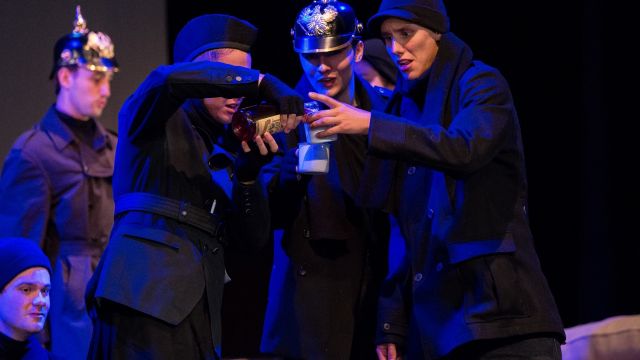All Is Calm
Promise Adelaide’s production of All is Calm is a rather sombre, moving and at times perplexing show. It focuses on that rather unique but true event in the history of WWI in which on Christmas Eve, 1914, German and British soldiers put down their weapons and met in ‘No Man’s Land’ in order to exchange Christmas greetings and well wishes.
The production is a type of ‘verbatim’ theatre in that it is a series of recollections from those involved, punctuated and supported by songs, Christmas songs as well as other popular WW1 songs.
Whilst there is much to admire about this production, notably the quality of the singing, nonetheless it suffered from one of the main pitfalls of ‘verbatim’ and confessional theatre in that it was not particularly dramatic. The narrative journey is one that takes you up to this extraordinary event, and the individual recollections are interesting and well performed, but only to a point.
 Whilst comparisons are odious, nonetheless, any production of this nature, and of this subject, falls within the shadow of Theatre Workshop’s brilliant Oh! What a Lovely War. Unfortunately, in this case, All is Calm is not as successful.
Whilst comparisons are odious, nonetheless, any production of this nature, and of this subject, falls within the shadow of Theatre Workshop’s brilliant Oh! What a Lovely War. Unfortunately, in this case, All is Calm is not as successful.
At 80 minutes, despite the best of intentions, the production sagged and became repetitive in tone, theme, pace and subject matter. Perhaps the creators felt the need to give each member of the relatively large male cast equal time? Admirable in intention, but repetitive in execution; virtually everything was dealt with in the same manner and tone.
Furthermore, whilst the singing is overall wonderful, the same issue of repetitiveness and relentless sombre pacing undermined the dramatic potential.
This work could benefit by a severe trimming, as well as seeking for a means to make it more dramatic and less confessional. For example, the journey to the event is one-sided; we only hear the voices of the British troops. Admittedly this is somewhat addressed when the so-called ‘truce’ occurs, but still it remains within the realm of confessional stories.
 The quality of the singing is for the most part absolutely terrific. However, I do have one criticism in this area, and again it is the sameness in sombre attitude that pervades each song. Rather than each lyric being claimed as a new thought, the songs are awash with generalised emotions. A closer observance to the unique quality of each lyric in each song would have made the work more dramatic.
The quality of the singing is for the most part absolutely terrific. However, I do have one criticism in this area, and again it is the sameness in sombre attitude that pervades each song. Rather than each lyric being claimed as a new thought, the songs are awash with generalised emotions. A closer observance to the unique quality of each lyric in each song would have made the work more dramatic.
Finally, I found the final moment of this production rather perplexing, and yet also a tribute to the seriousness of the piece.
A young boy stands with rifle and helmet next to a young WW1 soldier. I think the intention was to make an anti-war statement, ‘Less We Forget’ that such barbarity as seen in WW1 may happen again. However, the young boy stands with such a sense of bravery and honour that the final image could also be read as a kind of praise of such commitment–a commitment to ‘God, King and Country’. Consequently, I found this final image rather perplexing and confusing.
There is nothing admirable nor honourable about war. I’m sure that this is what the creators intended, but to have this boy look so noble as the final image makes one pause and question.
Tony Knight

Subscribe to our E-Newsletter, buy our latest print edition or find a Performing Arts book at Book Nook.

